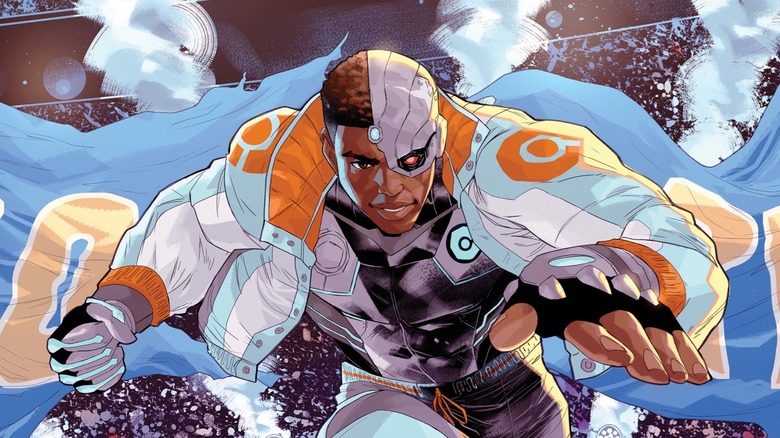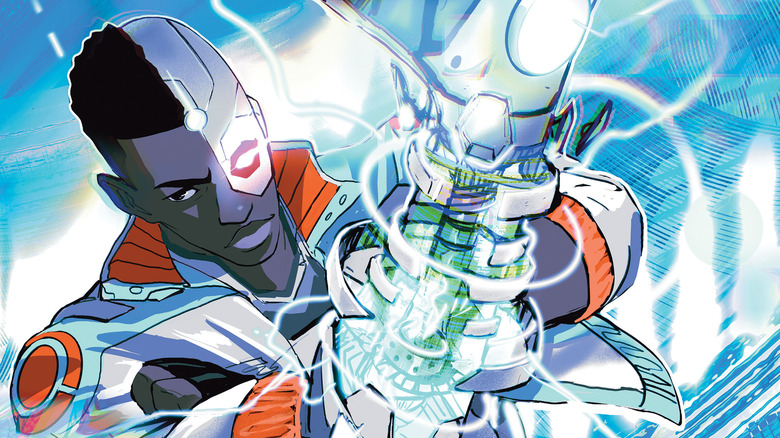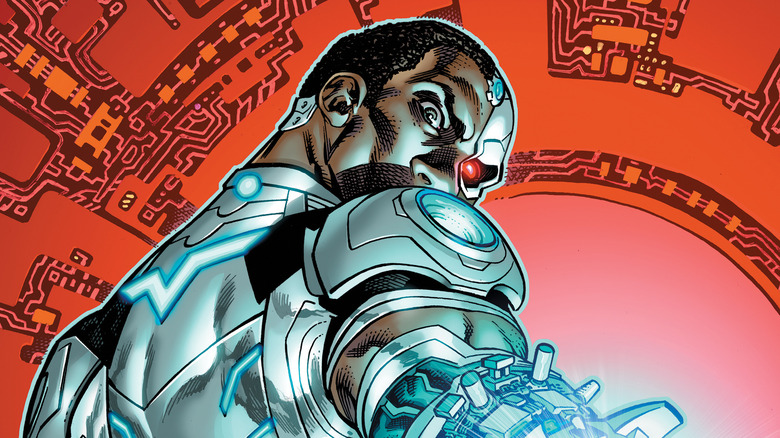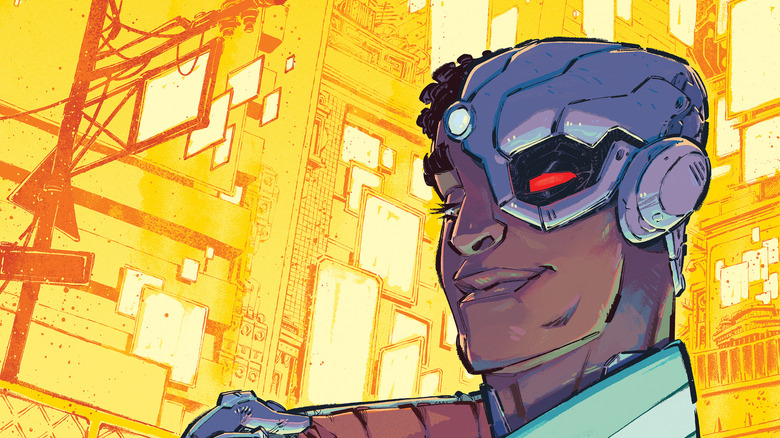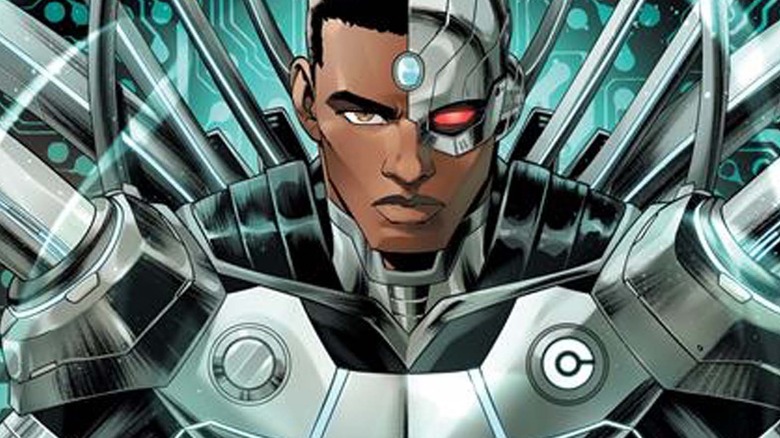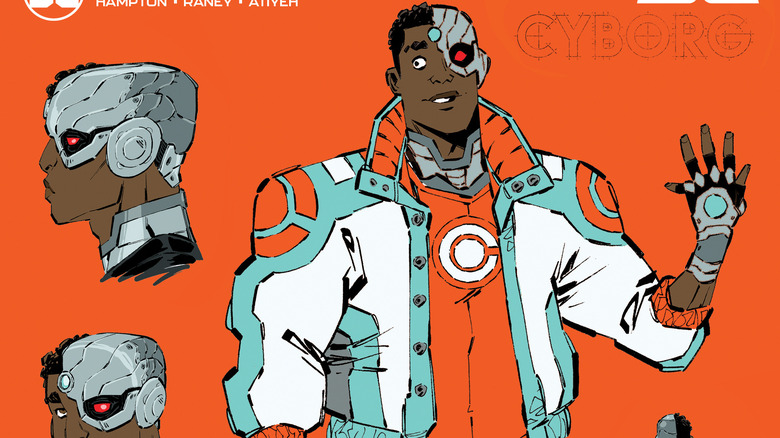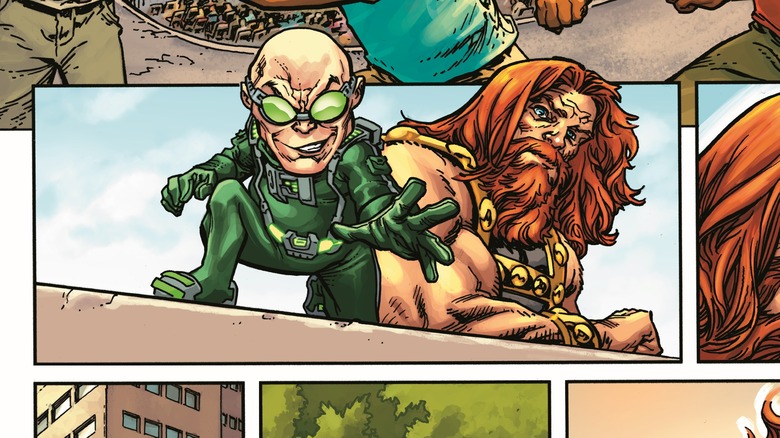Morgan Hampton Talks Cyborg And Giving The Hero His Much-Deserved Spotlight - Exclusive Interview
Cyborg's role in the DC Universe is about to expand, as the fan-favorite hero is about to star in his own six-issue miniseries as part of DC's "Dawn of DC" initiative.
Writer Morgan Hampton will be joined by artist Tom Raney for the new "Cyborg" series, which will take Cyborg back to Detroit as he returns home to deal with a personal tragedy. His homecoming will make Victor Stone realize that a lot has changed in the city he grew up with, as he's not exactly welcomed back with open arms by everyone. Cyborg will also have to deal with a few rising tech companies who are using artificial intelligence to transform Detroit — but not everyone who's involved has altruistic intentions. Cyborg will have to navigate emerging threats while being forced to confront his complicated history with his father.
We spoke with Hampton about writing his first DC Comics series, his relationship with Cyborg and why he wanted to tackle the hero, and what readers can expect in the new six-issue comic book.
How the Milestone Initiative prepared Hampton for working on Cyborg
How did the Milestone Initiative prepare you for this experience?
The Milestone Initiative was great ... I'd been self-publishing for maybe five years before that. Going through the Milestone Initiative taught me a lot of what I didn't know. When you're doing things on your own, you don't know what you don't know, so to speak. It taught me the ins and outs of what this publishing circus looks like.
We got to go through the wringer with working with other artists in the Initiative as well. We wrote an eight-page story over the course of ... They gave us more time than they normally would for professionals. To write it, we had about three weeks, and then the artist had about two months to draw it. It's coming out actually at the end of this month in the DC Talent Showcase, so you'll get to see all of the first things we ever did. But going through that process and getting that initial rep in set me up pretty good for the opportunities to come after.
When you started writing for the "DC Power" anthology, where you wrote the first Cyborg story, was the hero always a character that was on your radar?
Always. When I got the series, actually, I went back and dug up tweets that I posted from 5, 6, 7 years ago. I've been about this Cyborg life for a minute, so it's a dream come true to get to effect some change to the character that I've been screaming for into the abyss online for years. It feels great. I've definitely always been a fan of Cyborg.
Hampton's history with Cyborg
Is your relationship with the character from the comics? Is it "Teen Titans"? Is it all of the above?
All of the above. It began with the "Teen Titans" show. I just turned 30, so I was about 8, 9, 10 when that show was first coming out. I had my entry to comics with the TV shows first and then used that as a jumping-off point to go digging. I like Geoff Johns' run of "Teen Titans" in that same time period from the mid-2000s. I definitely started with the show, but once I got into comics, I always sought Cyborg out whenever I was getting my monthly stuff.
When you wrote the Milestone story, was that an inkling of, "Okay, I know I'm going to write about Cyborg"? Or was that something that led to it?
I had no idea that anything was going to happen afterward, honestly. It was a talent development program, and they want to do right by us and give us opportunities, but speaking for myself, I was like, "This could be the only opportunity I ever get." I didn't know that anything was ever going to come after that.
The stories that we wrote in that were all Milestone stories, so I have a story about Rocket. I wasn't sure if anything else would be coming after that. It wasn't for a few months that anything did, but I did my due diligence and reached out to a bunch of editors. Marquis Draper, the editor I'm working with on "Cyborg" and who I worked with on "DC Power," was one of the ones that answered and had an opportunity, and the rest is history.
Getting your foot in the door with DC and working with Tom Raney, what was that like?
That also came out of nowhere after I did the "DC Power" story. I finished a script in August. The art was finished in maybe October, November. It was the same thing. This is a thing, being a freelancer in this industry — I'm like, "All right. That was my opportunity. I don't know what's happening next." It was not on the horizon, even when I was working on this.
I remember they announced the "Cyborg" book, and I was not announced and attached to it at that time. I was like, "Dang, that'd be cool if I could do that." Internally, I was saying that. About a month later, Marquis reached out to me again and was like, "Hey, we're doing the 'Cyborg' book. I really liked your story for 'DC Power.' I think you've got some legs to tell a broader story with the character. Would you like to do it?" I was like, "Without a doubt, absolutely. I would like to do it." That's how I got on board with that.
Being mentored by Cyborg co-creator Marv Wolfman
With all that too and then getting mentored by Marv Wolfman, what was that like?
Marv has been great. It's been a little less now. I don't know if you saw, but after WonderCon, he hurt his shoulder, so he's been a little preoccupied with healing up. But early on — going back to what I said about the Milestone Initiative — he was giving a lot of notes about stuff that you don't know that you don't know when it comes to ... Like I said, I self-published for years, but I did a lot of shorts. "Cyborg" #1 is the first full-issue comic I've ever done before. This is a series too, so this is very uncharted territory for me.
A lot of it was stuff that you don't even think about when you were writing shorts for yourself to self-publish. A lot of it was, "Hey, dude. You got a lot of dialogue on this page. Maybe trim that down. Maybe give more room or spotlight to your characters. This is a book about Vic, so even though there might be some big revelation happening and someone else is saying that, you want to focus on Vic's reaction to that." It's a lot of stuff you don't think about, and it's great to get that type of stuff from the co-creator of Cyborg too. Also, a little intimidating — but really fun.
How important was it to get Cyborg right as he finally gets the spotlight again in the "Dawn of DC" initiative?
It's been a couple of years since Cyborg had a big role, and with the "Dawn of DC" initiative, it seems like he's getting that again.
It's really important for me. In general, Cyborg is a character that I've been frustrated with over the years, because I'm like, "This character has so much potential, but he doesn't get to see it, at least on the page." In movies and TV, they expand upon it a little bit more. But in comics, there's been a lot of lost opportunities to expand upon the character since he's been created. Getting that opportunity, it's great that I get to do that now, but also it's a lot of pressure because I've been one of the people screaming about how much he needs to grow and change his character.
I want to make sure I do right by that and make people happy. When they made the announcement for the book, I didn't even realize there were that many people out there that liked Cyborg like that. But it was a big response. Then I was like, "Oh, s***. I really got to do this now because people are definitely watching." I want to recontextualize the character while respecting what came before it. Hopefully, by the end of this series, Cyborg will have a more defined role in what he is as a character in the 21st century.
Bringing Cyborg back to Detroit
Why was it important to bring Cyborg back to Detroit?
Detroit has the potential to be a very big part of the character. I don't think it has been a huge part. I know that David Walker's series was in Detroit too. But there's an opportunity there to bring the city alive, which we haven't seen too much before, especially because a lot of DC characters are in fictional cities. The cool thing about DC is those cities are almost like a character unto themselves.
With Detroit, you have the opportunity to do that because Detroit has a lot of historical context to it, being a city of industry and having the history of Motown and all that type of stuff. But it's also a real city, so you can convey much of that on the page. That's what I hope to try and do. Six issues is tight, so I can't do too much, but I do want it to feel like — if you're from the area [or] if you've been to Detroit — it does feel authentic to the people that live there. At the same time, that contextualizes Cyborg a little bit as well, knowing what neighborhood he grew up in, what sports teams he would've followed living there, and stuff like that.
How does the city feel about his return? They've seen this hero come and go, and he gets a mixed reception.
Absolutely. That's something I wanted to do with this series too. Cyborg or Victor is that guy who was a banner for the city. He put Detroit on the map just being the athlete that he was, and he had a lot of potential. Then, in a different way — because he didn't get drafted to the NFL; he got that traumatic accident and turned into Cyborg, but he left. He's been out saving the world with the Justice League, with the Titans, and he does not come home that often.
There's going to be those people that are his ride-or-dies no matter what because he's from the city, but there's also going to be people that are not messing with him that way because, "Bro, you did leave. You're not here helping us the way that we need you to." There's a lot of that when Vic is home, and he has to navigate that. Showing that perspective, in my mind, also shows a lot of the perspective of the fans of Cyborg like myself up until this point who were clamoring for more from him. In this story, that's contextualizing in a way where it's, "Cyborg, we need you to do better" — but from a fan standpoint, we want more from the character. So that is my way of contextualizing that within the story.
Cyborg has a complex relationship with his father
The story deals with one of the more complex relationships in DC Comics between Victor and his father, Silas. What was it like to explore that dynamic? Without spoiling anything, there are some considerable changes coming.
Superheroes have their daddy issues. Like you said, Cyborg's got one of the more complex relationships with his father because he is someone that dramatically changed his life, but also it was in an effort to save his life. The thing that me and Marquis [Draper] and Tom [Raney] are trying to hone into with what Victor is going through in this series with his father is the power of choice. It's like, "Yeah, you did save my life, but you took that choice away from me."
I reread the "Tales of the Teen Titans" by Marv Wolfman, which was Cyborg's first solo outing ... where they showed his origin. There's a panel in there when he wakes up and he realizes that he's Cyborg. He's like, "Why didn't you let me die?" That's heavy. But it's like, "You took that choice away from your son."
I understand — no parents are going to want to let their kid die. But there's a deep wound there that I don't know has been super-duper explored. It's always like, "I don't mess with you because you did this to me." But can we contextualize what that looks like? Can we contextualize what that means for Cyborg as he navigates himself, as he navigates this body, and as he navigates forward? All of that is related to Silas.
What about Cyborg's new redesign?
It's awesome. I wasn't too involved with the process, but I'm always going to be happy for putting Cyborg in clothes. I've always liked his design, don't get me wrong. But there's something cool about just looking cool too. The outfit he has now is something that I would wear. As soon as they make a jacket or some sweatpants like that, I'm going to be the first in line to buy it.
That lends back to recontextualizing the character because it's got that casual, athleisure look, which is perfect for Cyborg. He doesn't need spandex. He needs something that fits more his vibe, and this definitely fits that. I like the updated color scheme as well. It's still a blue, but it's a teal-ish blue, and the orange really pops. I love it. It's great.
How exciting was it to see the redesign for the first time?
It was crazy. I was actually in Detroit at the time, because when I found out I was doing the book, I was like, "Hey, I've never been to Detroit. I should go and experience the city." One of my other friends from the Milestone Initiative who lives up there showed me around and gave me a lot of insights into the city and stuff like that. One of the days that I woke up in my hotel, I got an email from Marquis, and he was like, "Hey, this is the new redesign." I was like, "Yo, this is so dope." It was awesome. My jaw dropped.
Bringing in Teen Titans villains
How fun was it to pull from the history of the Titans and bring back Mammoth and Gizmo?
It's awesome. Going back to growing up and watching ["Teen Titans"], what was good about it — or what I enjoyed about it and still enjoy — is how goofy all the villains are. Obviously, they pose a threat if they're not taken seriously, but they're goofy and funny too. That's something that's at the heart of comic books. We live in a world where comics take themselves seriously — and they should, story-wise. But at the end of the day, some of these concepts are pretty out there and pretty wild. It's fun to poke fun at that while you're telling a more serious story.
What do you hope readers get from this series?
I hope people are happy with it. I hope people resonate with what I'm trying to do with Vic. I'm not the only one who is clamoring for Cyborg to have a run that raises him to his potential, but I do hope that's what people feel after this — that Cyborg deserves to have a series on his own. This is the third time that he's had one, and there's always been pretty big gaps in between them. I want to make fans happy. I want to make fans feel like this is a book that deserves to be on the shelves, and that Cyborg is here to stay, and that Cyborg is here to evolve.
Readers can check out the newest arc for Victor Stone in "Cyborg" #1 by Morgan Hampton, Tom Raney, and Michael Atiyeh from DC Comics, which arrives in comic book stores and online retailers on May 16, 2023.
This interview has been edited for clarity.
